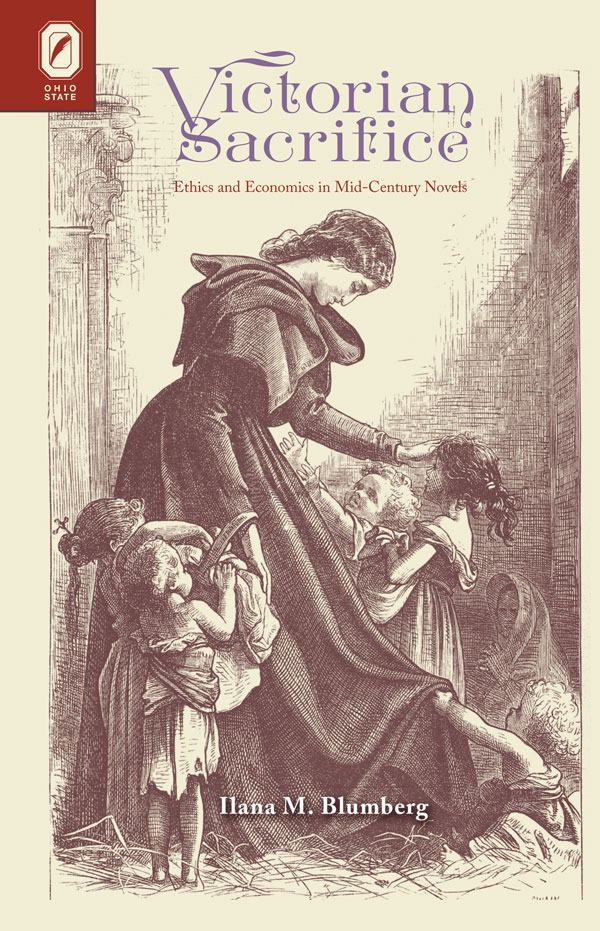Victorian SacrificeEthics and Economics in Mid-Century NovelsIlana M. BlumbergLiterature, Religion, and Postsecular Studies |
 9/16/2013 Literary Criticism/ 260 pp. 6x9  $69.95 cloth 978-0-8142-1226-4 Add cloth to shopping cart $21.95 paper 978-0-8142-5411-0 Add paper to shopping cart $14.95 CD 978-0-8142-9328-7 Add CD to shopping cart Shopping Cart Instructions Review/Change Shopping Cart & Check-out | |||
“Historians A. M. C. Waterman (Revolution, Economics, and Religion, 1991) and Boyd Hilton (The Age of Atonment, 1988) have shown how Christian theology inflected 18th- and 19th-century economics. Blumberg (Michigan State) reverses the question: how did economics shape 19th-century engagement with Christ’s ‘sacrificial free gift’? Drawing on novelists whose relationship to Christian faith ranged from High Church (Charlotte Yonge) to highly critical (George Eliot), Blumberg argues that the Victorians, critical of asceticism, melded self-sacrifice with rational self-interest and its counterpart, obligation to a communal good: self-sacrifice was worthless unless it conferred practical benefits to others. Thus, Yonge warns that relinquishing pleasure for no purpose perverts spiritual discipline, whereas Eliot finds that sainthood is incompatible with modernity, and Anthony Trollope frequently undercuts self-sacrifice altogether in a call for mutal enjoyment. Similarly, Dickens finds a community of ‘sinners’ essential to modern redemption, and Wilkie Collins proposes that the novelist’s ‘gift’ of himself might be ‘free’ in ways impossible in Victorian theology or economics. Finally, Mrs. Humphry Ward translates the debate from ‘individual suffering to collective growth.’ This book will profit from being read alongside Jan-Melissa Schramm’s Atonement and Self-Sacrifice in Nineteenth-Century Narrative (2010). Summing Up: Recommended. Upper-division undergraduates and above.” —M. E. Burstein, SUNY College at Brockport “What Ilana M. Blumberg examines, in her wholly original analysis, is a centrality of revalorizing and rewriting sacrifice in the work of mid-century realistic novelists whose interests, as least according to much recent criticism, have been supposed to lie with more immediately topical, social-political concerns. Her work belongs to the upsurge in criticism that takes seriously moral and ethical inquiry as a way into literature. Her strength is the ability to link ethical questions to structural questions, so that she shows how thoroughly interwoven points of narration are with points of ethics.” —Andrew Elfenbein, professor of English, University of Minnesota “Victorian Sacrifice offers a clear, distinctive, and sophisticated argument about the Victorians’ gradual shift away from an ethics of sacrifice and makes a significant contribution to our understanding of the Victorian novel. Ilana M. Blumberg’s discussion is crisp, the engagement with relevant critical literature is wide-ranging and intelligent, and the reading of the texts under discussion is extremely astute.” —Mark Knight, University of Toronto In Victorian Sacrifice: Ethics and Economics in Mid-Century Novels, Ilana M. Blumberg offers a major reconsideration of the central Victorian ethic of self-sacrifice, suggesting that much of what we have taken to be the moral psychology of Victorian fiction may be understood in terms of the dramatic confrontation between Christian theology and the world of modern economic theory. As Victorian writers Charlotte Mary Yonge, Charles Dickens, George Eliot, Anthony Trollope, Wilkie Collins, and Mary Augusta Ward strove to forge a practicable ethics that would reconcile the influences of an evangelical Christianity and its emphasis on selfless charity with the forces of laissez-faire capitalism and its emphasis on individual profit, they moved away from the cherished ideal of painful, solitary self-sacrifice in service of another’s good. Instead, Blumberg suggests, major novelists sought an ethical realism characterized by the belief that virtuous action could serve the collective benefit of the parties involved. At a mid-century moment of economic optimism, novelists transformed the ethical landscape by imagining what the sociologist Herbert Spencer would later call a “measured egoism,” an ethically responsible self-concern which might foster communal solidarity and material abundance. Bringing the recent literary turns to ethics and to economics into mutual conversation, Blumberg offers us a new lens on a matter as pressing today as it was 150 years ago: the search for an ethics adequate to the hopes and fears of a new economy. Ilana M. Blumberg is associate professor of humanities at the James Madison College, Michigan
State University. | ||||

